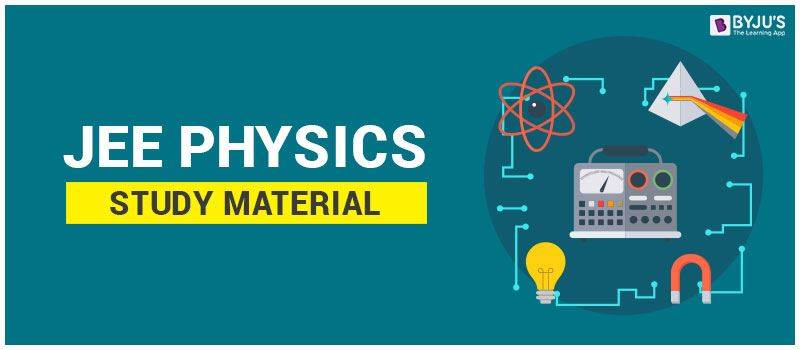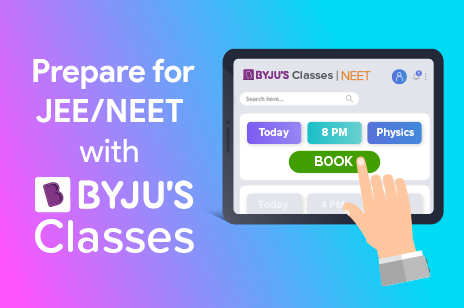
IIT JEE Physics Study Material – Physics has always been an interesting subject and it has also contributed greatly to the field of science and technology. However, when it comes to studying this subject, many students tend to think that it is difficult. Many are intimidated solely because the subject deals with a lot of numerical, theories, experiments, etc. Studying physics becomes more difficult especially for candidates who are preparing for JEE and other undergraduate level engineering entrance examinations. The IIT JEE Physics syllabus is vast and the concepts included are very much practical based and conceptual. They require adept analytical and problem -solving skills.
To help students grasp concepts clearly and study productively we have provided well-structured physics study materials on this page. These study materials are prepared by our highly experienced IIT JEE Expert faculty members who have laid a lot of stress on providing a conceptual clarity of each and every topic rather than just focusing on memorizing the formulas and solving problems. Hence, offering a valuable insight into our unique teaching methodologies and our authoritative approach to the strategies necessary for cracking highly competitive exams like JEE Mains and Advanced.
The IIT JEE physics notes further have an indispensable compilation of several important problems to inculcate critical thinking and problem-solving abilities in students.
Physics Study Material For IIT JEE
Get a hold of a comprehensive set of IIT JEE Physics study materials by clicking on the links given below.
For scoring well in this section, it is essential for students to have a strong conceptual base along with the knowledge of its practical applications. However, The students can easily score well in IIT JEE Physics section if they plan their preparations meticulously.
From the past few years IIT JEE trends, Magnetism, Electricity, and Mechanics constitute around 65 percent of total weightage. Hence, all these concepts are of utmost importance. Also, a strong conceptual base in mechanics is essential as it lays the foundation for magnetism and electrostatics as well. The students can also refer to the IIT JEE Physics important topics to get an analysis of the marks distribution and weightage of different topics included in physics syllabus and accordingly, a proper and effective study plan can be formulated.
Important Things To Remember While Studying Physics
The fundamental concepts of mathematics are covered in the introductory modules to help students in solving several physics problems. All the concepts are taught in a very systematic flow. All the formulas, laws, and examples are explained in the simplest possible ways and are mostly derived from daily life experiences.
IIT JEE Physics section demands a different approach and a separate methodology. Hence, a regular revision of these study materials will make you confident to tackle such type of problems with much better speed, accuracy, and time management. Besides, all these abilities will play a significant role in the success of students in this highly competitive exam. Alternatively, the success of these IIT JEE Physics study materials lies in making students capable of solving several complex problems by applying the basic fundamental principles.
JEE Physics Preparation Tips – How To Study Productively?
If we closely observe the paper analysis of JEE then most of the time students will find that the physics section is often the difficult section compared to maths and chemistry. The questions are mostly tricky and they are conceptual and calculation based. However, this does not mean that physics is difficult to crack. Candidates can actually master concepts easily and score higher marks if they adopt some useful study techniques and prepare accordingly. To help JEE candidates accelerate their JEE preparation and achieve an outstanding result in the main exam we will go through some of the best preparation tips for JEE below.
- Study In A Systematic Manner
Every time you sit down to study you should avoid studying in a haphazard manner. You should study the IIT JEE Physics book in a systematic manner where you should follow a sequence and start reading from the very first chapter and move on to the second chapter and the following chapters. You should also take your time and understand the whole chapter clearly before moving on to the next one.
- Variety Is More Important Than Quantity
You should focus more on solving a variety of questions especially numerical questions rather than solving just one type of question many times. Solving different types will enable you to be well prepared to tackle any questions that may be asked in the exam.
- Choose Study Materials Wisely
Today, if you browse through the web you will find a lot of study materials for JEE. There are a lot of IIT JEE Physics books available in the offline market as well. However, what you have to keep in mind here is that you should select only the right resources such that it will not only help you gain a better understanding of the concepts but you will also gain problem-solving skills. Some of the best physics books for IIT JEE are H.C. Verma and D.C. Pandey books amongst others. These study materials will definitely help you boost your JEE preparation.
- Make Time For Revision
Revisions are key during last-minute preparations for the main exam. This study exercise will help you be on track with the concepts. During this stage, you have to keep in mind not to learn any new concepts or topics. Meanwhile, as physics deals with a lot of formulas, equations, etc, you should keep a separate notebook or make flashcards which will help in easy reference and quick revision.
- Practice Solving Questions
In addition to the physics books, you should also practice solving problems from the JEE question paper. You can get hold of the sample papers, past papers, model paper, etc. and all of these will help you develop better problem-solving skills as well as time management skills. Furthermore, you will also gain a better idea about the exam pattern, marking scheme, types of questions, and more.
These are some of the effective tips that will not only help you prepare well but you will also overcome the fear of physics.
Frequently Asked Questions On IIT JEE Physics Study Material
How to choose the right JEE physics material for studying?
While there are a lot of study materials available in the market, selecting the right physics material is very important. Candidates should always choose a material that is oriented with the exam pattern. Since time is a crucial factor during JEE preparation, it will matter only if candidates make use of relevant materials which consists of detailed and clear explanations of concepts as well as JEE based exercises. These will help them to study productively.
How can I get better at solving physics problems in JEE?
Every candidate wants to score high marks in the exam. Therefore they need to be academically strong and have adept problem-solving skills. Candidates should not only study from different books but they should practice solving questions more and more. This is the most effective way to develop better problem-solving skills for physics. In this, candidates should start solving question papers including past papers and sample papers. Solving question will help them understand the concept more clearly and they will learn how they came up with the answer. Aspirants should also write the mock tests and it will help them get a better idea of the JEE exam pattern, duration of the exam, types of questions, etc.
How are the questions set in JEE compared to the exercises given in H.C. Verma and D.C. Pandey book?
These physics books are great reference tools for JEE. The questions that are found in the H.C. Verma and D.C. Pandey book are mostly based on the JEE exams. The books contain all types of questions with different levels of difficulty and students who solve them will be well prepared to tackle questions during the exams.
What is the difficulty level of the physics in JEE exams?
Well, the physics section is quite tough as the questions asked are tricky and they are designed to test in-depth knowledge of the concepts. Candidates should have efficient analytical as well as problem-solving skills. The questions are difficult and they take up more time compared to maths and chemistry section.
Is NCERT book helpful in mastering the concepts of physics?
JEE syllabus is mostly based on the NCERT and CBSE syllabus. Therefore, using NCERT books will come in handy. You should read through the chapters and make it a point to gain a clear understanding of the concepts. Besides, the language used in the book is simple while the concepts are explained in detail. Using this book will help candidates develop a strong foundation of concepts. However, in addition to NCERT books, candidates can also make use of other relevant books that will help them boost their JEE preparation.

